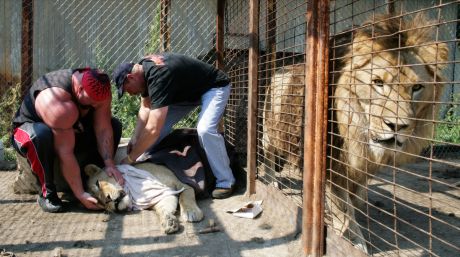
Pitting a phrase against a fact, the aptly-titled documentary The Elephant in the Living Room sheds light on a domestic problem with a foreign twist: the increasing popularity of exotic animals as pets.
Following Ohio-based animal expert extraordinaire Tim Harrison, director Mike Webber tracks the head-turning goings-on of exotic animal owners across the country. Periodic news clips — true stories ranging from Moe the missing chimpanzee to the fatal tiger attack at the San Francisco Zoo — and various exotic animal asides, like the surge in the Burmese python population in the Everglades, comprise much of the documentary.
At the heart of the film, however, is Harrison’s involvement with an Ohio man… and his family of African lions. Initially unconnected, Harrison’s work as a public safety officer-cum-animal rescue program director intersects with the tale of Terry Brumfield, a disabled man who’s lion Lambert is the only thing keeping him going. Needless to say, Harrison and Brumfield have somewhat conflicting beliefs — at least in the beginning — on how best to care for Lambert (as well as Brumfield’s other lion, Lambert’s girlfriend Lacy), yet they both care so much for him all the same.
The prevalence of big cats (there are an estimated 15,000 in the United States alone) and reptiles (an estimated 7.3 million) with private owners comes as no surprise to Harrison. As director of Outreach for Animals, a national organization described as “the number one advocate for proper behavior around wildlife,” Harrison is well attuned to the realities unbeknownst to many. “You can go to Anytown, USA; those animals are here.”
That’s not to say that Harrison supports such rampant wildlife ownership. Addressing many people’s exotic-animal naiveté, Harrison says “you’ve got to respect what they [the animals] are.” “It breaks my heart,” Harrison adds, “to see these animals that should be enjoying life in the wild… to have them end up like this… it’s just not right.”
Because the animals are so readily available at Amish auctions, trade shows, and certain pro-ownership organizations — not to mention completely legal in at least a dozen states — people assume that they are equipped to handle them.
Testifying against that assumption, one auction-attendee relates her experience with her macaque monkey. After the pet punched her, she recalls, she proceeded to “knock him in the head with a shovel.” Attesting to the absurdity of it all is Harrison’s colleague. “The only thing more bizarre than what we saw today would have been if they sold a child,” he offers.
For the most part, Harrison attributes the ever-increasing problem to the popularity of reality television shows, especially animal-based ones. As such shows attracted larger audiences Harrison witnessed a steadfast surge in ownership, saying that when he asks people why they purchased an exotic animal in the first place, the response is always, “‘I saw it on T.V.’”
Harrison’s advice? “We can write the laws, but we need to educate people,” he said. “You can buy a cobra, but you can’t buy common sense.”
While Harrison is all for the protection of the people, Webber is equally concerned about the protection of the pets in question. “What about the animals?” he asks. Such questions are what spurred Webber to make the film. “I was more interested in asking them than answering them,” he said.
Harrison, who has the tough job of weighing the welfare of the animals against the welfare of the humans, constantly grapples with a question of his own. “Am I a hero or a villain?” he asks.
In the case of Brumfield and his lions, though, Harrison is relieved. In his 34 years of experience, after dealing with Lambert, Harrison had seen his “first happy ending.”
The Elephant in the Living Room screens again on Saturday, February 13 at 6:30 p.m. at Victoria Hall Theater (33. W. Victoria St.).



